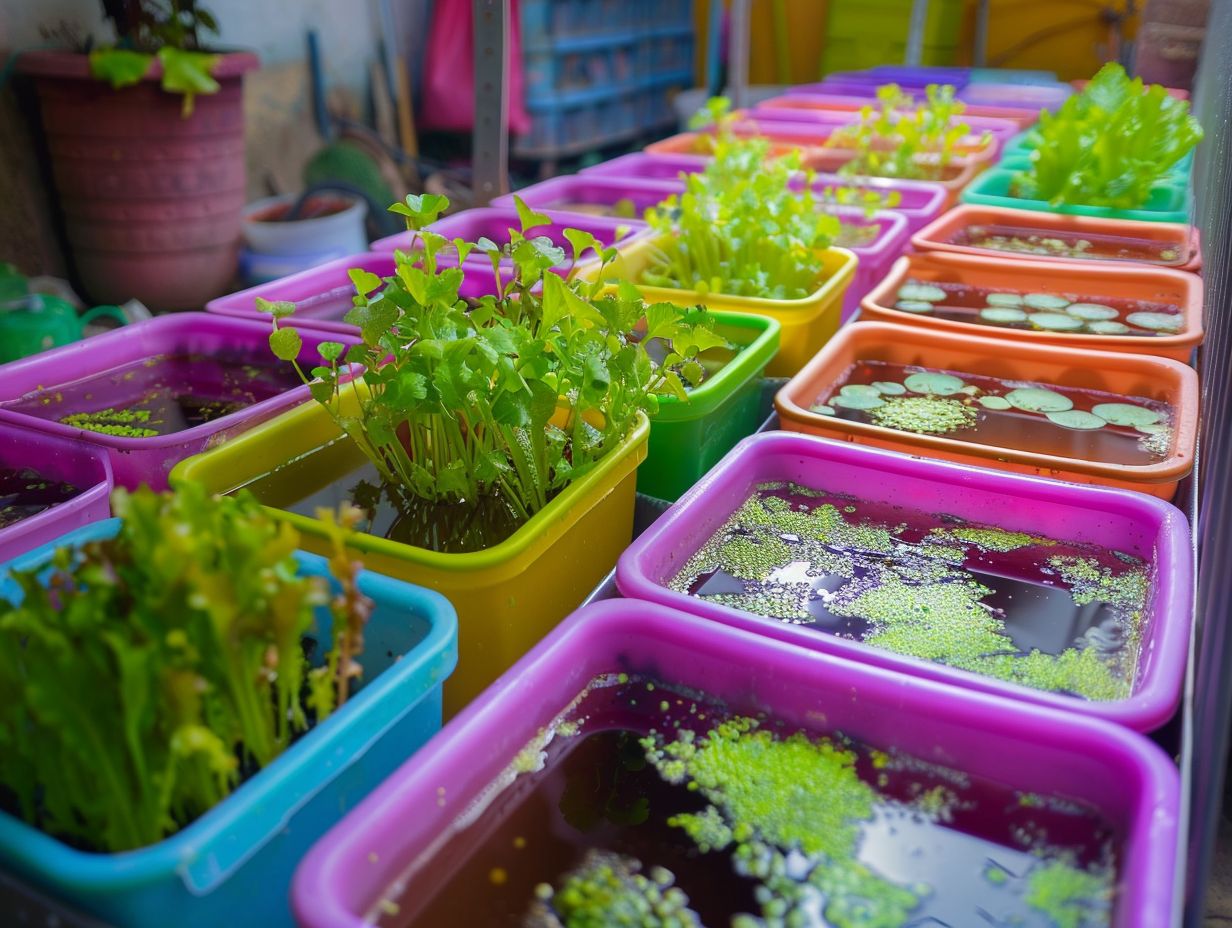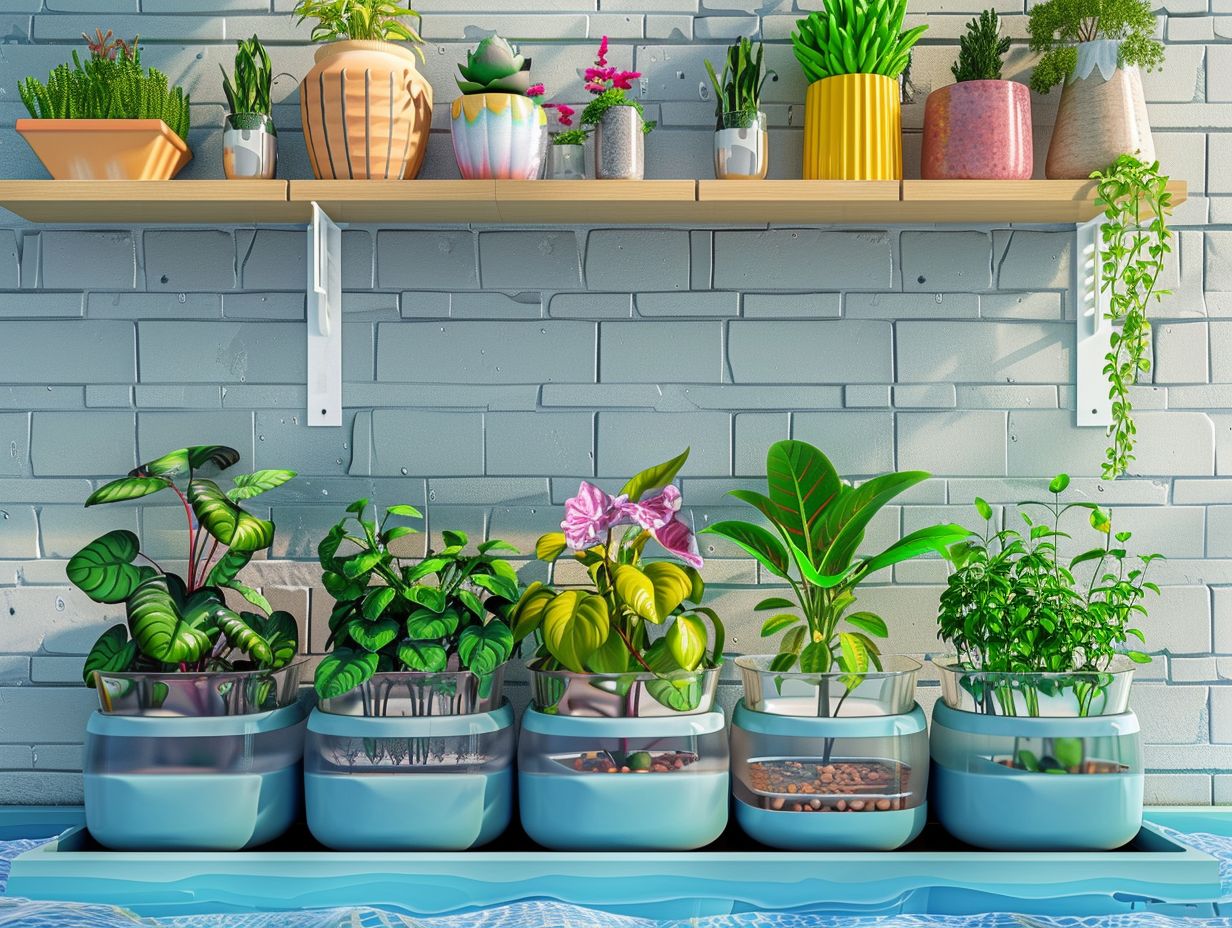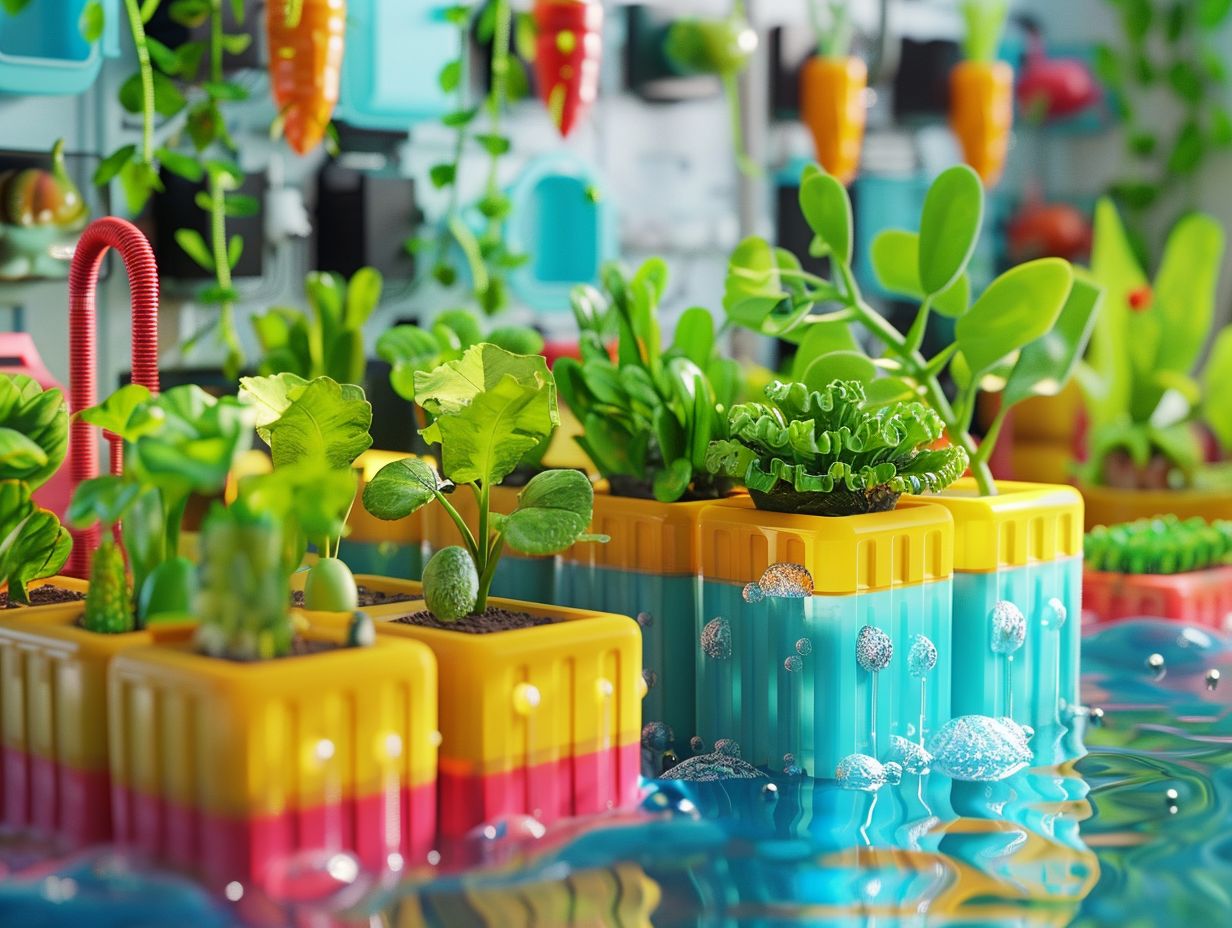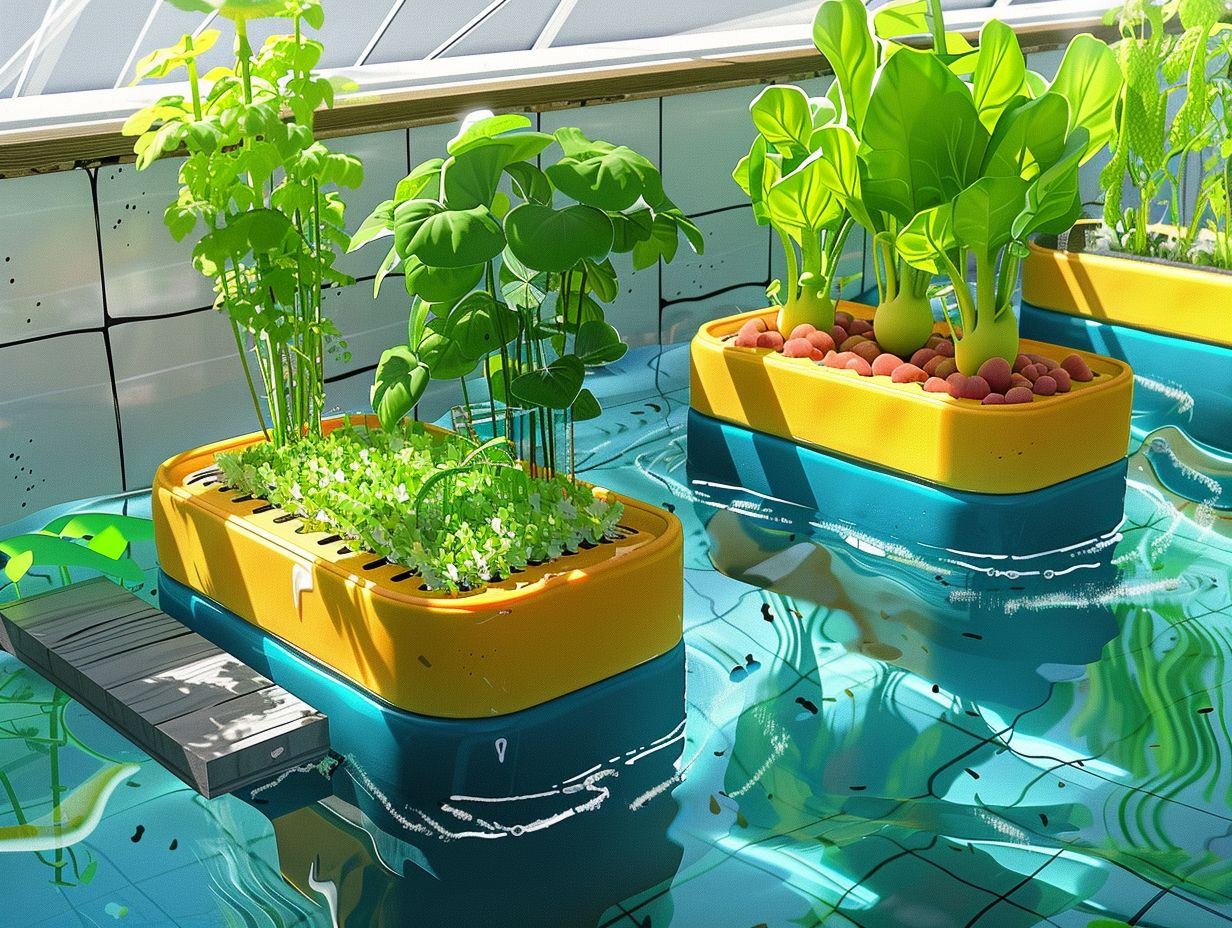Curious about hydroponic farming and the benefits it offers?
From efficient space utilization to water conservation and soil contamination prevention, this innovative farming method has gained popularity for its numerous advantages.
In this article, we will explore the different types of hydroponic systems, where you can purchase hydroponic farming supplies, and what factors to consider when buying these supplies.
Stay tuned to learn more about this sustainable and efficient farming practice!
Key Takeaways:

What is Hydroponic Farming?
Hydroponic farming is a method of growing plants without soil, using a nutrient-rich water solution to deliver essential nutrients directly to the plant roots. This soilless technique enables the cultivation of various crops in controlled indoor environments, such as Farmshelf units, maximizing space and efficiency.
This innovative method of agriculture allows plants to thrive by providing an optimal growing environment where water, light, and nutrients are carefully controlled. By eliminating the need for soil, hydroponic systems reduce the risk of pests and diseases commonly associated with traditional farming methods, leading to healthier plants and higher yields. The technology involved in hydroponic farming includes sophisticated monitoring and automation systems that ensure plants receive the perfect balance of nutrients for their growth cycle.
What are the Benefits of Hydroponic Farming?
Hydroponic farming offers numerous benefits, including sustainable living practices, access to fresh produce year-round, promoting local food accessibility, and addressing mental health challenges through engaging in educational farming activities.
One of the key advantages of hydroponic farming is the efficient use of resources like water and space. By growing plants in a water-based, nutrient-rich solution instead of soil, hydroponic systems require up to 90% less water than traditional soil-based farming methods. This not only conserves water but also minimizes the overall environmental impact of agriculture.
Hydroponic farms can be set up in urban areas, utilizing unused spaces and bringing fresh produce closer to communities. This proximity reduces carbon emissions associated with transportation, contributing to a more sustainable food system.
Efficient Use of Space
One of the key benefits of hydroponic farming is its efficient use of space, especially evident in vertical farming platforms and container farming setups, enabling year-round business operations.
Vertical farming structures in hydroponic systems are designed to maximize upwards space, utilizing towers or stacked levels to grow crops vertically in a controlled environment. This method significantly increases the yield per square foot compared to traditional farming practices.
On the other hand, container farming allows for the cultivation of crops in repurposed shipping containers, offering a compact yet highly productive system that can be implemented in various urban settings. With these innovative approaches, hydroponic farmers can capitalize on limited space while maintaining high productivity rates throughout the year.
Water Conservation
Hydroponic farming promotes water conservation by significantly reducing water usage compared to traditional methods, making it an environmentally friendly choice for sustainable agriculture and supporting local food access initiatives.
With hydroponic systems, plants receive water directly to their roots in a controlled environment, ensuring optimal absorption and minimal wastage. This precise delivery method conserves water, as the closed-loop systems recycle and reuse nutrient-infused water efficiently. A notable example of innovation in this field is Freight Farms, which utilizes vertical farming techniques inside repurposed shipping containers to grow fresh produce year-round. This approach not only saves water but also reduces the carbon footprint by minimizing transportation distances, enhancing the sustainability of local food supply chains.
No Soil Contamination
A major benefit of hydroponic farming is the elimination of soil contamination risks, making it ideal for educational farming activities that teach STEM concepts, support FFA programs, and explore plant science in controlled environments.
By removing the reliance on traditional soil cultivation, hydroponic systems provide a clean and sustainable alternative that significantly reduces the chance of soilborne diseases or chemical contamination. This aspect not only ensures the safety and purity of the produce but also opens up opportunities for educational institutions to integrate hands-on learning experiences related to agriculture, biology, and environmental sciences.
Hydroponic systems offer a unique platform for students to engage in practical experiments, delve into the intricacies of nutrient management, and grasp the delicate balance required for optimal plant growth.
What are the Different Types of Hydroponic Systems?
Hydroponic farming utilizes various systems, including Deep Water Culture (DWC), Ebb and Flow, Drip System, and Aeroponics, each offering unique methods of delivering nutrients and water to plants for optimal growth.
Deep Water Culture (DWC) involves suspending plant roots directly in a nutrient-rich water solution, promoting fast nutrient absorption and vigorous growth. Ebb and Flow systems periodically flood the plant roots with nutrient solution, allowing for oxygenation during drainage cycles.
The Drip System, on the other hand, delivers nutrients directly to the plant roots through a network of tubes and emitters, ensuring precise and efficient feeding. Aeroponics mists the roots with a nutrient solution, providing optimal oxygenation and hydration for accelerated plant development.
Deep Water Culture (DWC)
 Deep Water Culture (DWC) is a hydroponic system favored by chefs like Jos Andr s and Marcus Samuelsson for its simplicity and effectiveness in growing fresh produce hydroponically with minimal maintenance requirements.
Deep Water Culture (DWC) is a hydroponic system favored by chefs like Jos Andr s and Marcus Samuelsson for its simplicity and effectiveness in growing fresh produce hydroponically with minimal maintenance requirements.
Utilizing a DWC system involves suspending plant roots directly into a nutrient-rich solution, allowing for optimal nutrient absorption and accelerated growth rates. Chefs such as Jos Andr s and Marcus Samuelsson appreciate how DWC systems promote sustainable farming practices by conserving water and reducing soil erosion.
The ease of set-up and operation of DWC systems make them ideal for culinary experts aiming to cultivate herbs, leafy greens, and other produce effortlessly in their kitchens or restaurants. Jos Andr s and Marcus Samuelsson have successfully incorporated fresh, home-grown ingredients into their culinary creations, elevating the flavors and quality of their dishes.
Ebb and Flow
Ebb and Flow hydroponic systems, popular in locations like Oakland, CA, and adopted by institutions such as the University of North Texas Dining Services, allow for nutrient-rich water to cycle in and out of plant containers, promoting optimal growth.
This hydroponic technique operates on the principle of ebb and flow, where the nutrient solution temporarily floods the grow tray before gradually receding. This process ensures that plant roots receive an adequate supply of nutrients and oxygen, stimulating healthy growth.
In Oakland, CA, enthusiasts have embraced this system for its efficiency in providing a controlled environment for plant cultivation, reducing water usage and maximizing space. Meanwhile, the University of North Texas Dining Services has integrated the technology into their operations to facilitate sustainable food production and enhance the dining experience for students.
Drip System
The Drip System hydroponic setup, utilized in regions like Charleston, South Carolina, is a precise method of delivering nutrients directly to plant roots, making it a preferred choice for plant science enthusiasts and researchers.
In Charleston, where the humid subtropical climate can pose challenges to traditional gardening, the Drip System thrives by optimizing water usage and minimizing nutrient waste. Researchers are particularly drawn to its ability to provide accurate nutrient delivery, essential for conducting controlled experiments and achieving consistent results.
Aeroponics
Aeroponics, a cutting-edge hydroponic technique found in locations like Brockton and Taunton, Massachusetts, offers a unique way to grow plants without soil, making it an innovative solution for addressing mental health challenges through therapeutic gardening activities.
Unlike traditional farming methods, Aeroponics involves suspending plant roots in the air and misting them with a nutrient-rich solution, allowing for enhanced nutrient absorption and faster growth rates.
This system not only maximizes crop yield but also minimizes water usage, making it a sustainable choice for regions facing water scarcity.
In places like Brockton and Taunton, where urban agriculture initiatives have been on the rise, Aeroponics presents an opportunity to cultivate fresh produce locally and combat food insecurity.
Where Can You Buy Hydroponic Farming Supplies?
Hydroponic farming supplies can be purchased from various sources, including online retailers, specialized hydroponic stores, local farming supply stores, and DIY home improvement stores like those in Ume , Sweden, catering to DIY enthusiasts.
In terms of online retailers, options such as Amazon, HydroponicStore.com, and Home Depot offer a wide range of hydroponic equipment and nutrients, making it convenient for growers to have products delivered right to their doorstep.
Specialized hydroponic stores like Freight Farms in the USA provide expert guidance and top-of-the-line hydroponic systems for commercial and home growers alike.
Local farming supply stores in rural areas often carry essential hydroponic components, offering a more personalized shopping experience for customers seeking local expertise.
Moreover, DIY stores like Bauhaus and Jula give the power to individuals to create their custom hydroponic setups, promoting sustainability and innovation in gardening practices.
Online Retailers
Online retailers offer a convenient way to purchase hydroponic farming supplies, with technology-savvy hubs like those in Peachtree Corners, Georgia, providing a wide range of products for indoor gardening enthusiasts.
These digital platforms cater to individuals seeking hydroponic supplies across the globe, delivering everything from nutrient solutions to grow lights right at your doorstep. Whether you are a beginner looking to set up a small hydroponic system in your apartment or a seasoned grower in need of advanced equipment, online retailers in Peachtree Corners, Georgia, have you covered.
Hydroponic Stores
Hydroponic stores, such as those in Kodiak, Alaska, specialize in offering essential nutrients, growing mediums, and equipment tailored to the needs of indoor gardeners, ensuring optimal plant growth and health.
These stores provide a wide range of hydroponic supplies, including pH meters, grow lights, and plant nutrients, all designed to create a thriving indoor garden environment. By sourcing products from specialized hydroponic stores in locations like Kodiak, Alaska, enthusiasts can access expert advice and guidance on selecting the most suitable supplies for their specific plants, fostering improved yields and healthier crops. The convenience of having all necessary items under one roof simplifies the shopping experience for both novice and experienced hydroponic gardeners. Whether you are starting a new hydroponic project or looking to enhance an existing setup, these dedicated stores offer a curated selection of products that cater to various gardening goals, ultimately leading to successful harvests and lush greenery.
Local Farming Supply Stores
 Local farming supply stores in regions like Nassau, The Bahamas, offer a community-centric approach to hydroponic farming supplies, supporting the cultivation of diverse crops and promoting sustainable practices.
Local farming supply stores in regions like Nassau, The Bahamas, offer a community-centric approach to hydroponic farming supplies, supporting the cultivation of diverse crops and promoting sustainable practices.
These stores play a vital role in equipping urban growers with the necessary resources to grow a wide range of plants efficiently and cost-effectively. By providing access to specialized hydroponic equipment, nutrient solutions, and expert advice, they give the power to individuals and communities to engage in agriculture regardless of space constraints.
These stores facilitate a deeper connection between urban dwellers and their food sources, fostering a sense of responsibility towards sustainable practices and environmental stewardship. As a result, local farming supply stores serve as hubs for knowledge exchange and community engagement, driving the growth of urban agriculture initiatives in Nassau and beyond.
DIY Stores
DIY home improvement stores, such as those in Martin, Kentucky, offer a selection of hydroponic supplies and kits, including innovative solutions like Farmshelf units, catering to DIY enthusiasts and indoor gardening hobbyists.
These stores provide a wide range of hydroponic equipment, from basic starter kits to advanced systems, making it convenient for customers to find everything they need in one place. The availability of different grow lights, nutrients, growing mediums, and accessories adds to the allure of these stores for anyone looking to set up a hydroponic garden.
Whether you are a seasoned hydroponics expert or a beginner looking to try your hand at soil-free gardening, these stores offer products that suit various skill levels and preferences. The knowledgeable staff at these stores are often eager to offer guidance and advice on choosing the right hydroponic supplies for specific projects.
What to Consider When Buying Hydroponic Farming Supplies?
When purchasing hydroponic farming supplies, it is essential to consider factors such as the quality of products, cost-effectiveness, customer reviews, and return policies to ensure a satisfactory shopping experience and successful gardening endeavors.
High-quality hydroponic supplies are crucial for the health and productivity of your indoor garden. Opting for superior products may initially seem pricier, but in the long run, it can save you time and money due to their durability and effectiveness. Customer feedback serves as a valuable resource, offering insights into the real-world performance of items you’re interested in. A clear return policy ensures that you can address any issues swiftly, guaranteeing a seamless shopping process and reducing potential frustrations.
Quality of Products
Ensuring the quality of hydroponic products is paramount, with trusted brands like Back to the Roots from Chicago, Illinois, offering reliable solutions for indoor gardening enthusiasts seeking high-performance supplies.
In terms of hydroponic gardening, the quality of products cannot be understated. This is where renowned brands like Back to the Roots shine, providing a range of reliable solutions that cater to the specific needs of indoor gardening aficionados. The carefully crafted supplies from trusted companies offer not just functionality but also durability, ensuring that your hydroponic setup remains efficient and productive over the long haul. Back to the Roots, with its reputation for excellence and innovation in the industry, is a go-to choice for those who value performance and reliability in their hydroponic endeavors.
Cost
Considering the cost of hydroponic supplies is crucial for those embracing sustainable living practices, with affordability playing a key role in making indoor gardening accessible to individuals in regions like Morgan Hill, California.
Hydroponic farming not only offers a sustainable way to grow fresh produce but also reduces the environmental impact of traditional agriculture. In regions like Morgan Hill, California, where the community values sustainable living, the affordability factor of hydroponic supplies becomes even more significant. Indoor gardening pursuits, enabled by cost-effective hydroponic solutions, allow enthusiasts to cultivate a wide variety of plants without the need for extensive outdoor space.
Customer Reviews
Reading customer reviews of hydroponic supplies, whether in person or online, can provide valuable insights into product performance and suitability, helping technology-driven communities in San Antonio, Texas, make informed purchasing decisions
.
These reviews serve as a virtual guidebook, offering firsthand experiences and feedback that aid in determining the best fit for specific needs and preferences. Feedback from actual users can shed light on crucial aspects such as ease of use, durability, and overall satisfaction. By tapping into the collective wisdom of fellow consumers, individuals in San Antonio and beyond can ensure they are investing in high-quality hydroponic equipment that aligns with their goals and expectations. This data-driven approach to decision-making elevates the shopping experience, allowing enthusiasts to navigate the vast array of products with confidence and clarity.
Return Policies
Understanding the return policies of suppliers is essential for customers exploring hydroponic gardening, particularly in STEM-focused areas like The Woodlands, Texas, where education and customer service intersect for informed choices.
Return policies play a crucial role in providing peace of mind to customers, ensuring they can easily exchange or return products if they don’t meet expectations. In The Woodlands, Texas, with its emphasis on STEM education, retailers understand the importance of post-purchase support for customers venturing into hydroponics. This commitment to customer satisfaction sets the region apart and contributes to building a strong community around sustainable gardening practices.
Conclusion
 Hydroponic farming represents a promising solution for sustainable living by providing fresh produce, supporting local food access initiatives, addressing mental health challenges through educational activities, and enabling year-round business opportunities in container farming.
Hydroponic farming represents a promising solution for sustainable living by providing fresh produce, supporting local food access initiatives, addressing mental health challenges through educational activities, and enabling year-round business opportunities in container farming.
One of the key benefits of hydroponic farming is its ability to reduce water usage by up to 90% compared to traditional soil-based agriculture, making it a more sustainable option in water-scarce regions. The controlled environment of hydroponic systems minimizes the need for pesticides and herbicides, resulting in fresh produce that is not only healthier but also free from harmful chemicals.
Plus the sustainability aspect, hydroponic farming has a positive community impact by creating local employment opportunities, promoting food security by producing food closer to urban centers, and engaging communities through educational programs on modern farming techniques.
Frequently Asked Questions
1. Where can I buy hydroponic farming equipment?
There are several options for purchasing hydroponic farming equipment. You can buy them online from retailers such as Amazon or specialized hydroponic supply stores. You can also find them at local gardening stores or through direct purchase from hydroponic equipment manufacturers.
2. Can I buy hydroponic farming supplies at my local hardware store?
While some hardware stores may carry a limited selection of hydroponic supplies, it is recommended to purchase from specialized hydroponic stores for a wider selection and better quality products. This will ensure that you have everything you need for successful hydroponic farming.
3. Where can I buy hydroponic nutrients?
Hydroponic nutrients can be purchased at most gardening stores, online hydroponic retailers, and specialized hydroponic supply stores. It is important to choose high-quality nutrients specifically designed for hydroponic farming to ensure the best results.
4. Can I buy a complete hydroponic system?
Yes, you can purchase complete hydroponic systems at various retailers. These systems come with all the necessary equipment and instructions for setting up your own hydroponic farm. You may also find DIY hydroponic system kits that you can assemble yourself.
5. Where is the best place to buy hydroponic farming supplies?
The best place to buy hydroponic farming supplies will depend on your location and specific needs. It is recommended to compare prices and product quality from multiple sources, such as online retailers, local stores, and direct from manufacturers, to find the best option for you.
6. Can I buy pre-grown hydroponic plants?
Yes, you can buy pre-grown hydroponic plants from various sources. Some hydroponic farms may sell their produce directly to consumers, or you can find pre-grown plants at local markets or grocery stores. You can also purchase seeds or seedlings to grow your own hydroponic plants.
Leave a Reply